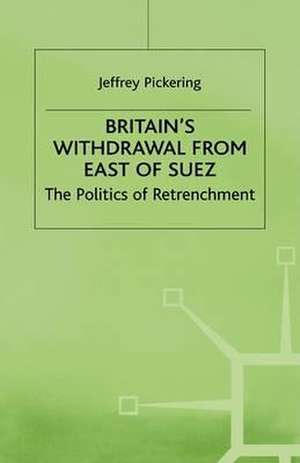Britain's Withdrawal From East of Suez: Contemporary History in Context
Autor J. Pickeringen Limba Engleză Hardback – 13 iul 1998
Din seria Contemporary History in Context
- 15%
 Preț: 643.99 lei
Preț: 643.99 lei -
 Preț: 418.83 lei
Preț: 418.83 lei - 15%
 Preț: 644.30 lei
Preț: 644.30 lei -
 Preț: 384.70 lei
Preț: 384.70 lei - 15%
 Preț: 644.30 lei
Preț: 644.30 lei -
 Preț: 350.89 lei
Preț: 350.89 lei - 15%
 Preț: 642.03 lei
Preț: 642.03 lei - 18%
 Preț: 1112.60 lei
Preț: 1112.60 lei - 15%
 Preț: 641.71 lei
Preț: 641.71 lei - 15%
 Preț: 643.00 lei
Preț: 643.00 lei - 15%
 Preț: 645.60 lei
Preț: 645.60 lei -
 Preț: 384.31 lei
Preț: 384.31 lei - 15%
 Preț: 635.96 lei
Preț: 635.96 lei - 15%
 Preț: 640.24 lei
Preț: 640.24 lei - 15%
 Preț: 641.71 lei
Preț: 641.71 lei - 15%
 Preț: 644.82 lei
Preț: 644.82 lei - 15%
 Preț: 642.51 lei
Preț: 642.51 lei - 15%
 Preț: 644.95 lei
Preț: 644.95 lei - 18%
 Preț: 1381.43 lei
Preț: 1381.43 lei -
 Preț: 417.68 lei
Preț: 417.68 lei
Preț: 641.85 lei
Preț vechi: 755.13 lei
-15% Nou
Puncte Express: 963
Preț estimativ în valută:
122.83€ • 127.51$ • 102.42£
122.83€ • 127.51$ • 102.42£
Carte tipărită la comandă
Livrare economică 22 martie-05 aprilie
Preluare comenzi: 021 569.72.76
Specificații
ISBN-13: 9780333695265
ISBN-10: 0333695267
Pagini: 230
Ilustrații: XI, 230 p.
Dimensiuni: 140 x 216 x 18 mm
Greutate: 0.46 kg
Ediția:1998
Editura: Palgrave Macmillan UK
Colecția Palgrave Macmillan
Seria Contemporary History in Context
Locul publicării:London, United Kingdom
ISBN-10: 0333695267
Pagini: 230
Ilustrații: XI, 230 p.
Dimensiuni: 140 x 216 x 18 mm
Greutate: 0.46 kg
Ediția:1998
Editura: Palgrave Macmillan UK
Colecția Palgrave Macmillan
Seria Contemporary History in Context
Locul publicării:London, United Kingdom
Cuprins
General Editor's Preface Acknowledgements Introduction: Perspectives on the Withdrawal from World Power Decline and the Politics of Retrenchment The Return to Normalcy: Postwar British Strategy Holding Courses: The Labour Government of 1945-51 and the Struggle over Strategy Reappraisal: The Suez Crisis and its Aftermath, 1957-60 Setting the Stage: Longer - Term Implications of Suez Relinquishing World Power: Britain's Financial Crises of 1966-7 Conclusions: Politics, History, and the East of Suez Decision Index
Recenzii
`Pickering's study provides a compelling theoretical framework for understanding the process of great power retrenchment. By examining the interplay between economic decline, the Suez crisis, and domestic politics, Pickering demonstrates convincingly that more than one factor was at work in explaining Britain's withdrawal from its military network east of Suez. The institutional restructuring which took place in Britain after 1945, and which was intended to preserve Britain's role east of Suez, instead hastened its withdrawal.' - Lawrence LeDuc, Professor of Political Science, University of Toronto, for the Samuel H. Beer prize committee
'This important and stimulating study, grounded meticulously in archival research and interviews, makes a significant contribution to the literature in two key areas. Firstly, by focusing on the process of domestic politics and coalition-building within the Cabinet, rather than simply economic determinism, it provides a new, and much more convincing, explanation for one of the most important events in twentieth century British foreign policy: the withdrawal from `east of Suez'. Secondly, by building on the work of Bruce Russett and Paul Kennedy, it provides a more comprehensive understanding, not simply of British retrenchment in the 1960s' but of contemporary great power over-extension and decline in general. It will be of interest to a wide range of students in the diplomatic history and international relations fields.' - Professor John Baylis, University of Wales, Aberystwyth
'This important and stimulating study, grounded meticulously in archival research and interviews, makes a significant contribution to the literature in two key areas. Firstly, by focusing on the process of domestic politics and coalition-building within the Cabinet, rather than simply economic determinism, it provides a new, and much more convincing, explanation for one of the most important events in twentieth century British foreign policy: the withdrawal from `east of Suez'. Secondly, by building on the work of Bruce Russett and Paul Kennedy, it provides a more comprehensive understanding, not simply of British retrenchment in the 1960s' but of contemporary great power over-extension and decline in general. It will be of interest to a wide range of students in the diplomatic history and international relations fields.' - Professor John Baylis, University of Wales, Aberystwyth
Notă biografică
Jeffrey Pickering is Assistant Professor of Political Science at Kansas State University.
















